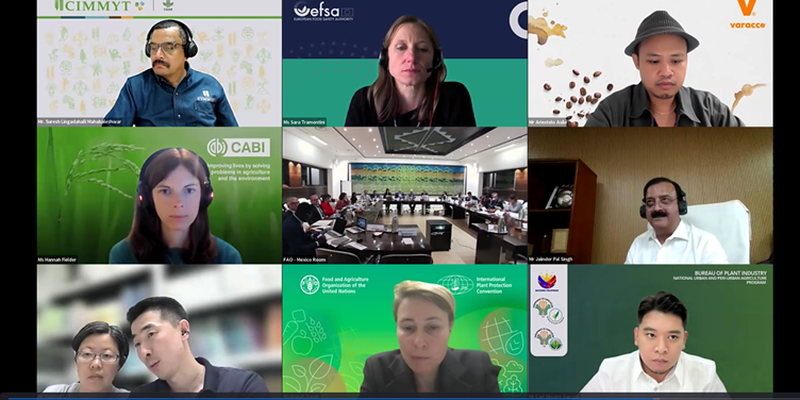Global Webinar Showcases Smart Plant Health Innovations to the International Community
Posted on Mon, 26 May 2025, 14:35

Rome, 21 May 2025 – Digital diagnostics, artificial intelligence-driven pest detection, and smart surveillance tools took the spotlight during a global webinar organized by the International Plant Protection Convention (IPPC) Secretariat. Designed to promote innovative plant health solutions to a broad international audience, the session attracted over 400 participants from national and regional plant protection organizations, donor agencies, research institutions, and the private sector.
The event, “Smart Plant Health – What Does the Future Look Like?”, featured seven forward-looking projects, selected through a global call for submissions launched in March 2025. Participants included representatives from the European Union, the Standards and Trade Development Facility (STDF), and other key partners and stakeholders.
“This webinar was about connecting innovation with opportunity,” said Sarah Brunel, Officer-in-Charge for the day-to-day matters, IPPC Secretariat and Lead of the Implementation and Facilitation Unit. “We saw concrete examples of how smart technologies are already being used to strengthen plant health systems — and we opened the door for collaboration and support to help scale them further.”
Smart Solutions on a Global Stage
The webinar offered a fast-paced look at innovation in action — with contributions from national plant protection organization (NPPOs), international research centres, startups, and national authorities.
- Monitoring pest risk with open-source intelligence: Hannah Fielder of the Centre for Agriculture and Bioscience International (CABI), in collaboration with the European Food Safety Authority (EFSA), presented the Epidemic Intelligence from Open Sources (EIOS) platform — a tool that scans global digital sources to provide early warning of pest outbreaks.
- Smart surveillance for Maize Lethal Necrosis: Suresh Lingadahalli Mahabaleshwar of the International Maize and Wheat Improvement Center (CIMMYT) shared a multi-country approach using remote sensing and coordinated field diagnostics to manage Maize Lethal Necrosis, one of the most destructive viral diseases affecting maize crops in Eastern and Southern Africa.
- Ultrasound beetle detection in wood packaging: Berend de Klerk, Co-founder and CEO of Plense Technologies, demonstrated a novel acoustic sensor system that uses machine learning to detect pests hidden in wooden packaging materials — a major innovation for trade compliance and pest risk reduction.
- Smart FARM: sustainable farming through technology: Ariestelo Asilo, President of Varacco Inc. (Philippines), introduced an integrated solution combining Internet of Things (IoT) devices, blockchain traceability, and nano-biofertilizers to support traceable, sustainable farming practices for smallholders.
- Artificial intelligence-driven crop protection in Beijing: Yunlong Li of the Beijing Plant Protection Station presented a government-led system that uses artificial intelligence and integrated data platforms to guide pest control decisions in real time across China’s capital region.
- Digitizing trade with the IPPC ePhyto Solution in Senegal: Papa Massar Fall, representing the NPPO of Senegal, shared insights on the country’s successful adoption of the IPPC ePhyto Solution — a digital platform that replaces paper-based phytosanitary certificates with electronic ones, improving speed, reliability, and international trust in trade certification.
- Scaling learning through the IPPC Plant Health Campus in India: Jaiinder Pal Singh, Plant Protection Adviser at the Directorate of Plant Protection, Quarantine & Storage, Ministry of Agriculture and Farmers Welfare, India, presented how India is integrating the IPPC Plant Health Campus and its e-learning courses, into the country’s national training system for plant health professionals.
A Community United by Innovation
The session drew strong participation from across government, research, and the private-sector. A dynamic Q&A session and panel discussion enabled attendees to explore challenges, opportunities, and lessons learned across all projects presented.
The conversation also underscored the relevance of innovation in plant health to broader global frameworks — including the One Health approach, which links plant, animal, and human health, and the Sustainable Development Goals (SDGs), particularly in the areas of food security, environmental sustainability, and international trade facilitation.
In closing remarks, Selvaraju Ramasamy, Senior Officer at the FAO Office of Innovation, praised the energy and breadth of the session: “Innovation is not only about new technologies — it’s about changing mindsets, building partnerships, and delivering solutions that work for the people in real contexts,” he said. “The projects showcased today demonstrate how bundles of technological, institutional, social, policy and financial innovations are already shaping the future of plant health — and it’s collaborative, evidence-based, and action-oriented.”
A recording of the webinar, speaker presentations, and the full Q&A summary will be available shortly on the IPPC event page.

